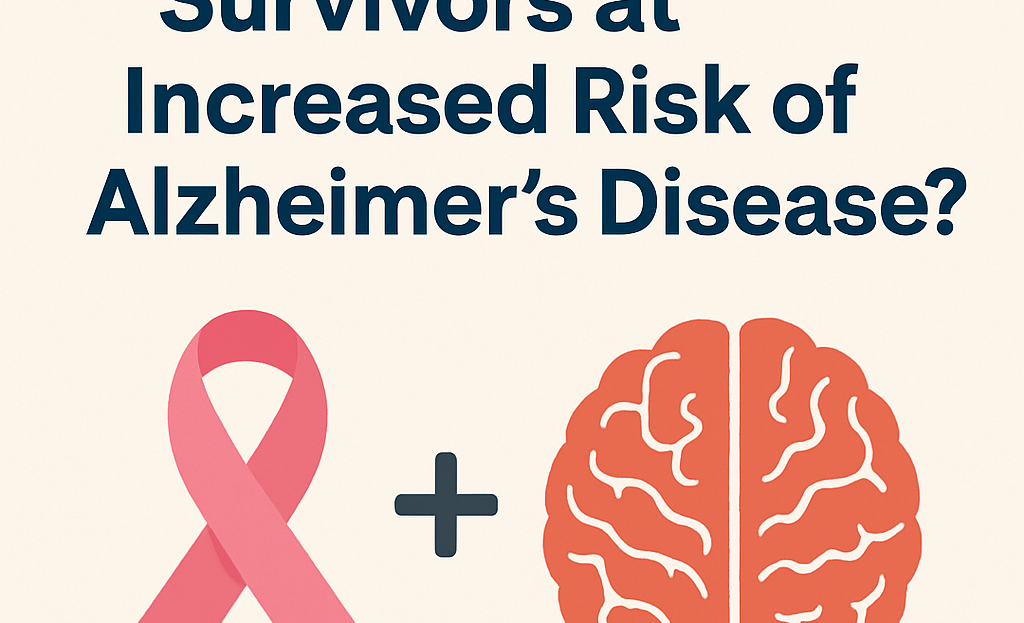Large Korean cohort finds no increased Alzheimer’s risk among breast cancer survivors—radiotherapy may offer short-term protection.
Introduction
Breast cancer survival rates have soared—yet concerns about long-term cognitive health persist. The term "chemobrain" captures these fears, but does surviving cancer raise your risk for Alzheimer’s disease?
A sweeping study, recently published in JAMA Network Open and covered by Medscape, analyzed data from South Korea’s National Health Insurance Service, comparing 70,701 breast cancer survivors diagnosed between 2010–2016 with 180,360 cancer-free women.
Cohort Overview & Treatment Details
-
Average age: 53 years
-
Treatment received:
-
Radiotherapy: ~72 %
-
Chemotherapy: Cyclophosphamide 57%, Anthracyclines 50%
-
Endocrine therapy: Tamoxifen 47%, Aromatase inhibitors 30%
-
-
Median follow‑up: ~7 years
-
Primary outcome: New Alzheimer’s diagnoses based on prescriptions for Donepezil, Memantine, Rivastigmine, or Galantamine
Key Findings on Alzheimer’s Risk
-
Short-term reduction (within 6 months) but no long-term difference at 12, 36, or 60 months
Comorbidities & Alzheimer’s Risk Factors
The study identified several major risk amplifiers:
-
Smoking
-
Diabetes
-
Chronic kidney disease
Life factors like alcohol use, exercise, and hypertension were not independently associated in this cohort.
Why Might Radiotherapy Show Short-Term Protection?
While causality remains uncertain, hypotheses include:
-
Neuroimmune modulation—radiation may dampen neuroinflammation
-
Detection bias—closer follow-up yielding temporary protective correlations
-
Statistical artifact—the effect disappears over time, raising questions
It’s an association, not proof—and not a basis for treatment decisions.
Study Strengths vs. Limitations
Strengths:
-
Massive sample size with a long follow-up period
-
Robust control matching
-
Treatment-specific analyses
Limitations:
-
Findings from Korean population—may not generalize globally
-
Focused solely on Alzheimer’s, not broader cognitive decline
-
Neuroimaging or biomarker data were not collected
Implications for Patients & Oncologists
For Breast Cancer Survivors:
-
Positive news: No long-term Alzheimer’s risk increase
-
Short-term reduced risk: Not a lasting effect—stay proactive
-
Manage chronic conditions: Target smoking, diabetes, and kidney disease
-
Support cognitive health: Embrace mental exercises, social connection, and healthy living
For Oncologists & Healthcare Providers:
-
Dispelling myths around chemobrain: Use this study to relieve patients' fears
-
Holistic surveillance: Integrate cognitive health into follow-up care
If you’re a breast cancer survivor worried about memory or aging, take action today—
Book an appointment with a leading oncologist through RatedDoctor.com. Prioritize your long-term wellness with care tailored to your unique medical history.
For Oncologists & Specialists:
Join our community on RatedDoctor—create your profile, share your expertise, and publish evidence-based insights like this one.
Help shape public understanding and grow your professional footprint through social media shares on LinkedIn, Facebook, and X.
This large-scale Korean study confirms what many hoped: breast cancer treatment does not increase Alzheimer’s risk, and radiotherapy may even provide brief protective benefits. Still, the real focus should be on comprehensive health—managing conditions like diabetes and smoking—and nurturing cognitive resilience through lifestyle and medical collaboration.





